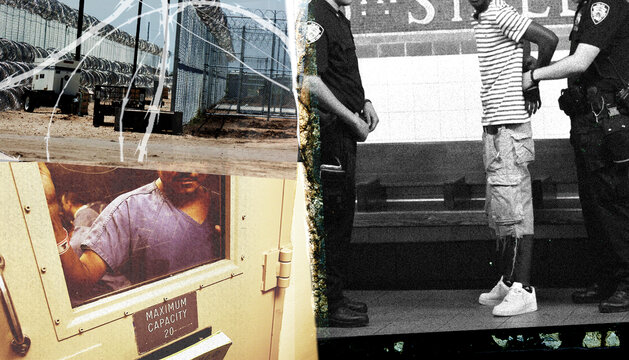
The Dehumanizing Work of Immigration Law
America’s immigration rules are unduly harsh, leading to family separation and other needless suffering.

Part of
This essay is part of the Brennan Center’s series examining the punitive excess that has come to define America’s criminal legal system.
During his confirmation hearing to be attorney general, when asked about the Trump administration’s policy of separating children from their parents at the U.S.–Mexico border, Merrick Garland repudiated the policy, stating “I can’t imagine anything worse.”
Yet, now that he is confirmed, Attorney General Garland presides over an agency that represents the U.S. government in court arguing every day that parents should be separated from their children, brothers from sisters, grandchildren from grandparents. Family separation is baked into our immigration system. It is as much a part of that system as is family unification. Unless our elected officials make significant changes to laws and policies, Garland’s name will appear on thousands of case captions opposite a person facing family separation, often permanent.
Public officials historically have justified their participation in our immigration system’s daily sundering of family ties by invoking the rule of law. We are a nation of immigrants, after all, “but we are also a nation of laws.” People who want to be here, we are repeatedly told, need to do it “the right way.” Those who violate our laws will face consequences. The comfortable invocation of these bromides requires the assumption that the law provides sensible avenues for deserving people, particularly those with strong family ties to the United States, to enter or remain legally. But the reality is much different. In fact, our immigration laws are exceptionally harsh in ways that frequently defy common sense.
First, we need to acknowledge that the notion that there is a “right way” to immigrate is just not true for many people. Most long-term, undocumented residents, for example, do not fit the law’s rigid categories for lawful immigration, even though they are longstanding members of our communities and do some of the nation’s most essential work. The annals of U.S. immigration history are filled with the stories of men like Oscar Martinez, an undocumented resident in the United States for 25 years with a loving family and community, who have nevertheless been deported because they could not navigate a legal path to citizenship.
Even when long-term residents have found a way to regularize their status — such as when marriage to a citizen opens up the possibility of a spousal visa — our laws make it almost impossible to do things “the right way.” A noncitizen who marries a citizen generally becomes eligible for a visa sponsored by her citizen spouse. But the law requires anyone who has been in the country for more than a year without authorization to leave the country to process her visa, whereupon she faces a 10-year bar before reentering on that family-sponsored visa.
Noncitizens with Temporary Protected Status (TPS) might have been spared some of this legally imposed separation. TPS holders who became eligible for family-based or employment-based visas during their time in the United States successfully argued to several federal appeals courts that their admission to the TPS program was a legal admission that allows them to bypass the need to leave the country and face the 10-year reentry bar when processing their family-based visas. Yet Assistant Attorney General Michael Huston argued before the Supreme Court in April that the better reading of an ambiguous statute was to treat TPS holders as if they have not been “admitted” when they seek to adjust their status based on an available visa. The Supreme Court unanimously agreed.
This sounds like a banal and technical argument, but the effect is to require TPS holders, many of whom have now lived in the United States for two decades, to leave the country and contend with the 10-year reentry bar when they otherwise qualify for a visa granting lawful permanent resident status. The full weight of the U.S. government was thus brought to bear in favor of a legal position that will inevitably require more needless family separations.
Second, our country has not always honored its own legal processes when immigrants are doing things “the right way.” For example, U.S. treaty obligations prohibit the government from penalizing asylum seekers who arrive at the border without documents. But under President Trump, when Central American asylum seekers presented themselves to U.S. Border Patrol agents at the southern border in 2018 and 2019, as permitted by law, many were criminally prosecuted and thousands of parents were separated from their children.
While that family separation policy generated a national outcry, and even drew criticism from the government itself, there was little public attention paid to the tens of thousands of others who were turned back and told to remain in Mexico, often in situations of great peril, while they awaited their hearing. When the U.S. government shut down asylum processing in the wake of Covid-19, doing things “the right way” turned increasingly deadly as conditions deteriorated in migrant camps.
Notwithstanding the Biden administration’s promise to reverse harsh Trump-era policies, it took the administration until June 1 — more than four months — to formally terminate the so-called “Migration Protection Protocol,” prolonging the misery of asylum seekers who, by the end of the Trump administration, had already languished in Mexico for as long as two years. Even now, asylum seekers face an overburdened system where they sometimes have to wait years to have their claims adjudicated and where five-year-old children have had to appear without counsel in proceedings.
Third, long-time lawful permanent residents who have contact with the criminal legal system are often denied the chance to do things “the right way.” Criminal records, no matter how old or how minor — for instance, for marijuana-related convictions involving conduct that is no longer even criminal in some jurisdictions — are often a barrier to regularizing an immigrant’s status and remaining in the United States.
The law allows for the deportation of long-time residents, including lawful permanent residents, for offenses that were not deportable offenses at the time of their commission. In describing the harsh effects of these immigration laws, Nancy Morawetz discussed a deportation case the government was pursuing in 2000 on the basis of a conviction for possession of a small amount of drugs in 1978, three years after the immigrant entered the country as a lawful permanent resident. U.S. law requires deportation for a long list of relatively minor offenses regardless of a person’s family ties, length in the country, or service in the U.S. military.
Our national severity toward those charged with crimes reverberates far beyond the criminal legal system, weighing down those who have already served sentences for crimes. The pattern of overpolicing that plagues Black and Latino communities ensures that immigrants from these racial groups are overrepresented among those deported on criminal grounds or barred by criminal convictions from obtaining lawful status and naturalizing.
In 2014, at the very same time that President Obama and other members of his administration were critiquing the racial inequities of our criminal legal system, it was dismaying to hear them doubling down on their reliance on a noncitizen’s contacts with the criminal legal system as the basis upon which to prioritize them for removal. We were told that the administration would deport “felons, not families, criminals not children” even though it was clear that families would be separated by the removal of those labeled “felons,” and that the felony label itself emerges out of a criminal legal system that is both overly punitive and racially discriminatory.
Again and again, notions of the rule of law are invoked to justify the sundering of families and communities that would, in other circumstances, seem unthinkable. Courts have played an essential role in shoring up the dehumanizing narratives that enable our nation’s harsh enforcement practices. In decisions that laid the groundwork for today’s exceptionally severe immigration laws, the Supreme Court has treated workers coming to fill jobs in the United States as a threat to public safety and security.
In upholding the constitutionality of interior immigration checkpoint stops in the 1976 case of U.S. v. Martinez-Fuerte, Justice Lewis Powell justified these stops — including those made on the basis of race — as necessary to address the “formidable law enforcement problems” posed by the “flow” of a population that he describes at the outset of the opinion as “illegal Mexican aliens.” In Justice Sandra Day O’Connor’s 1984 decision in INS v. Lopez-Mendoza, she concludes that illegally obtained evidence can be used against immigrants in their deportation proceedings, analogizing the ongoing presence of an unauthorized immigrant worker to “a leaking hazardous waste dump.”
Notably, both of these decisions were handed down before the enactment of the 1986 Immigration Reform and Control Act. At the time, no law prohibited employers from hiring these immigrant workers; indeed, employers were actively recruiting the very immigrant workers whose “flow” was treated by the Supreme Court as such a toxic menace. Employers hired workers with impunity, yet governmental officials were given license to violate these workers’ Fourth Amendment protections when enforcing the immigration laws. Immigrant workers paid a price for perceived lawlessness; those whose recruitment efforts brought them to the United States did not. And the price increased when legal changes in the 1980s and 1990s attached expansive penalties to new crimes of migration, made it more difficult for immigrants to regularize their status, and vastly increased the range of criminal violations that would bar immigrants from coming to or remaining in the United States
Today, people routinely use the term “illegal” not to refer to the law enforcement practices like the Migrant Protection Policy that openly violate U.S. treaty obligations, or to the hiring practices of many of the nation’s employers, but to describe immigrants as outside of the law, always threatening to it. For people thus dehumanized, no legal consequences seem too severe; for them, the law is a threatening sword, not a protective shield.
American economic policies, climate policies, and foreign policy choices play a significant role in shaping the forces that drive people in neighboring countries from their homes. Yet when those displaced persons — many with family and other affective ties to the United States — arrive at our borders, we use law as a cudgel against them and deploy legal language to mask our inhumanity.
I can’t imagine anything worse.
Jennifer M. Chacón is a professor of law at the University of California, Berkeley, School of Law.
More from the Punitive Excess series
-
Monetary Sanctions as a Pound of Flesh
America has established a two-tiered system of justice: one for people with financial means and one for people without. -
How Atrocious Prisons Conditions Make Us All Less Safe
The American prison system seems designed to ensure that people return to incarceration instead of successfully reentering society. -
The Prosecutor Problem
A former assistant U.S. attorney explains how prosecutors’ decisions are fueling mass incarceration — and what can be done about it.



